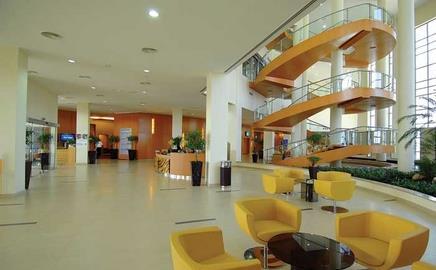The Middle East’s grand schoolbuilding plans present a great opportunity for UK firms, so long as they appreciate the unique challenges of the market – as two speakers at December’s BSEC MENA conference explain
British firms must firmly grasp the educational differences between the Middle East and Europe if they are to take advantage of the wealth of schoolbuilding opportunities in the region.

Mukund Patel, Gems
This is the message from Mukund Patel, chief officer at private education provider GEMS and former adviser to the UK government, who will be speaking at the Building Schools Exhibition & Conference Middle East & North Africa (BSEC MENA) in Abu Dhabi in December.
The two-day event, to be held in partnership with the Abu Dhabi Education Council (ADEC), will focus on the delivery of educational facilities and programmes across the region.
Speaking to Building ahead of the conference, Patel says a desire to improve all education, from nurseries to universities, is creating opportunities “everywhere” but UK firms must invest time in understanding the local market.
He says: “In Dubai alone GEMS has four different curriculums – Indian, British and American, plus the International Baccalaureate. That influences design. For instance, the US curriculum is very sports focused – the amount of sports facilities they want is incredible.
“In the state schools there are requirements for Islamic studies, things like prayer rooms, and, certainly in Saudi, segregation will come in as well. Design firms need to understand all this and demonstrate they can deliver the right schools.”
Patel’s own firm, which already runs schools across the Middle East and North Africa, aims to have 5 million pupils on its books by 2025. He says they are looking for “exciting and inspirational” buildings that challenge conventions. “A lot of schools have a very institutional feel about them,” he says. “People’s expectations are changing and we should create a lot more social space for pupils. Why shouldn’t four or five of them sit down with their coffee and laptops and do some project work?
“Let’s use all of that enthusiasm for IT and iPods and turn it to learning as well.”
Professor Stephen Heppell, an expert on ICT in education couldn’t agree more. Heppell, who will also be speaking at December’s conference, has long been calling for new approaches for school design, with more open spaces.
However, he is concerned the message is not getting through to all design teams. “There are some strong 21st century schools being built where people have thought about what is effective and convenient, and there isn’t a corridor in sight,” he says. “At the same time there are schools which are just glitzy versions of what was there before and we are going to have to take them down in 10 years’ time.”
Heppell, who is also a strong advocate for small-scale schools, argues that the location of the MENA region makes it key to driving global education in the right direction. “The region is pivotal because it’s an area that bridges cultures and continents,” he says. “More than anywhere else, these schools are preparing global citizens rather than local citizens.”
This is why it is vital for UK firms to seize the construction opportunities in the Middle East and put themselves at the forefront of educational development, he argues. “There’s an opportunity here to capture learning in the way that the US captured movies. A lot of learning around the world has been a factory model but the Western way for the last 50 years has been to think for yourself. There’s a chance here to absolutely lead the world.”
BSEC Mena conference
Mukund Patel and Stephen Heppell will be joined by speakers from across the MENA region at the conference on 13-14 December. Other panellists include ADEC’s director general, Dr Mugheer Khamis Al-Khaily, and director of Jordan’s Madrasati initiative, Danah Dajani. To sign up or to learn more, visit http://www.buildingschools.co.uk

























No comments yet